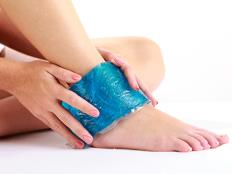Learning to Run More Relaxed
Now that we know what relaxed smooth ease is, let's tackle the question of how to get it. There are three ways.
1. Run unconsciously.
You can't force yourself to run more relaxed. That works about as well as willing yourself to sleep. Research by scientists at the University of M?nster in Germany has shown that runners become less economical if they even think about their body's movements or their breathing when they run. It's the unconscious part of your brain that you must rely on to develop relaxed smooth ease. Any conscious interference will only slow the process.
This principle, too, applies across all sports. One study found that basketball players shot more accurately when they focused on the basket rim instead of their wrist movement, while another study found that swimmers were faster when they focused on pushing water with their arms versus moving their arms through the water.
What is the equivalent to focusing on the basket rim in running? Focusing on your effort, or the overall task of moving forward. If you do this instead of consciously trying to emulate some image of ideal form, you will run more relaxed and also gain additional relaxed smooth ease more quickly.
2. Run more.
The most effective thing you can do to accelerate the process of running more relaxed is to simply run more. Each additional stride you take is another opportunity for your brain to learn something new from your body that reduces the amount of brain and muscle activation required to run at any given speed. This is what Arthur Lydiard was getting at. However, whereas Lydiard associated relaxed smooth easy with fitness, work by Stephen McGregor of Eastern Michigan University has shown that fitness and skill are entirely separate.
McGregor brought a group of collegiate runners and a group of competitive triathletes into his lab, put them on a treadmill, and measured their aerobic capacity (i.e., fitness) and their control entropy (i.e., relaxed smooth ease). He found that aerobic capacity was equal between the runners and the triathletes, which wasn't surprising because they did similar amounts of training. But control entropy was higher in the runners. Why? Because they ran more.
More: Distance Running: How Many Miles Should You Run?
3. Run fast (occasionally).
In order to run more without burning yourself out, you need to keep the pace slow most of the time. But running fast is beneficial too, because when you run fast, your body pushes against the constraints that limit your efficiency. It's in these moments that the brain learns the most from the body about how to move more efficiently.
Run about 80 percent of your training at low intensity and the other 20 percent at moderate to high intensity. It so happens that this balance is best for fitness development as well.
Do you want better running form? Just keep running.
 Sign up for your next race.
Sign up for your next race.- 2
- of
- 2
About the Author

Get ACTIVE on the Go


Couch to 5K®
The best way to get new runners off the couch and across the finish line of their first 5K.
Available for iOS | Android






Discuss This Article